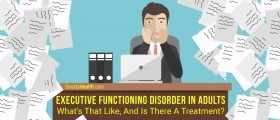
Executive functions are cognitive abilities that control other abilities and behaviors. Any kind of goal-directed behavior demands executive functions that actually initiate or stop one’s actions, monitor and moderate behavior and create a plan for any future actions. The executive functions are also adaptive capabilities that maintain person's effectiveness and normal functioning.
The normal pattern of executive functioning
Normal executive function is divided into six different stages. High-level tasks, conducted with the aid of executive functions are first being analyzed. Based on the analysis, person makes more or less detailed plan how to deal with the task. The third stage is organization and it involves considering the steps necessary to carry out the task. Next, person will develop timelines and then adjust or moderate the steps needed to complete the task successfully. Last step is to complete the task in an appropriate way.
Executive function disorder
Executive function disorder is a condition in which a person fails to perform normal executive functions due to the problems with analyzing, planning, organizing, scheduling or completing the tasks in a timely way. This kind of disorder is associated with many common learning disabilities, and it strikes children and adults all over the world. Most of the people function normally and perform all of the executive functioning tasks on the subconscious level. However, persons affected with executive function disorder do not perform these tasks intuitively as they have serious problems with planning, organizing, and managing their time and tasks. Persons suffering with executive function disorder may have troubles in: Estimations or visualizing outcomes, Analyzing images and sounds, Perceiving correctly time distance and efforts, Evaluating possible outcomes of different strategies, Choosing the appropriate actions Performing tasks, Tips and helpful strategies
Executive functioning problems may be highly disabling, especially, for school kids. This kind of disability may sometimes even run in the families and cause serious problems in the workplace, in school and at home. However, people with executive functioning disability may use some of the effective and simple strategies to help themselves conducting everyday activities.
For example, they could use planners, organizers, computers or timers. They could track their daily obligations using the visual schedules and make sure to review them more frequently. These people will find a regular daily routine very helpful. Parents should use positive reinforcement to help their kids and encourage them to use “to do” lists. It may also be helpful to break complex tasks into the smaller ones and complete the assignments bit by bit.

















Your thoughts on this
Loading...